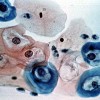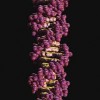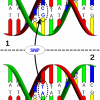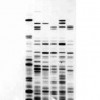Posts tagged dna

HPV twist?
Nov 17th
Human Papilloma Virus (HPV) is a family of small, non-enveloped DNA viruses which infect epithelial cells, and of which there are over 100 subtypes. HPV is divided into two major categories, high risk types which includes types 16, 18, 31. 33, 35. 39, 45, and low risk types 6 and 11. HPV 16 is implicated in over 90% of cervical cancers and shown to be a causal factor in the development of the disease. HPV produces two oncoproteins, E6 and E7, which inactivate the cellular tumor suppressor proteins, p53 and pRB respectively. This allows it to disable two of the More >

Does New DNA Always Mean New Traits?
Nov 10th
I was teaching a class of fifth grade students last week and we were discussing the characteristics of DNA and cells. As a group, we described how the human body is made up of a variety of cell types, including muscle cells, nerve cells, and more. I explained that although cells can be diverse in their appearance and functions, within one organism they all have the same DNA (except for mature red blood cells and gametes). The reason that a nerve cell is different from a bone cell is simply that they use different recipes in different ways.
A student then More >

Diverse Proteins
Oct 14th
The instructions for life are carried in the DNA of our cells. All day long, our cells read the information in our DNA and make proteins. While DNA contains recipes for how life works, proteins are molecules that I consider the “doers” in our cells.
Protein is a broad category that includes enzymes and hormones. When you eat an apple, your body produces enzymes to break down that apple and build new products for your body. If you have a lot of glucose (a type of sugar) in your blood, the cells in your pancreas will read the gene for insulin More >

The Future of Medicine
Oct 13th
Emerging DNA technologies continue to offer us many new insights into our genome, and its implications on human disease. One area that is currently under much scrutiny is how different patients are responding differently to certain drug treatments. Researchers are now finding that some people have a genetic predisposition to how they will react to a drug. If there is some way that we could detect this in the doctor’s office as they are writing the prescription, it would help save time and lives as we try to combat these diseases.
The Imperial College London and its affiliate-company DNA Electronics have More >

DNA Authentication
Sep 2nd
While recent advances in DNA technology have revolutionized the field of forensic science, it also makes us question whether or not the evidence at a crime scene is genuine. Basic techniques such as PCR, molecular cloning, and the most recent whole genome amplification, allow for someone to synthesize DNA under any genetic profile in vitro. This artificial DNA can then be implanted into human tissues or placed on the surface of objects, and planted at a crime scene. Current forensic procedure cannot distinguish between artificial and natural DNA samples.
The company Nucleix is now offering a tool to distinguish between natural and More >

Do Genes Always Follow the Rules?
Aug 31st
As a teacher, I find that the presentation of classical Mendelian inheritance is important, but can be misleading. Do genes always follow the rules that the “Father of Genetics” observed in his garden? Don’t get me wrong, I appreciate Mendel and his contribution to genetics, but the exceptions seem much more interesting!
For example, many genes are pleiotropic, meaning they affect more than one phenotype. How about the recent development on red heads and anasthetics? I happen to live with a red head, from a long line of red heads, so in our family this was a topic of discussion for days. The mutation More >
